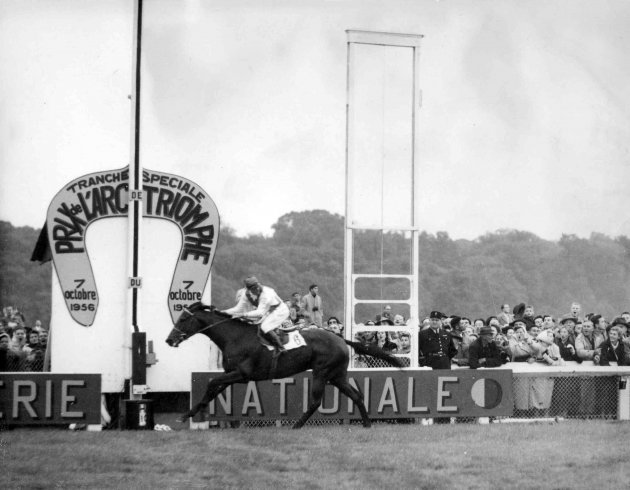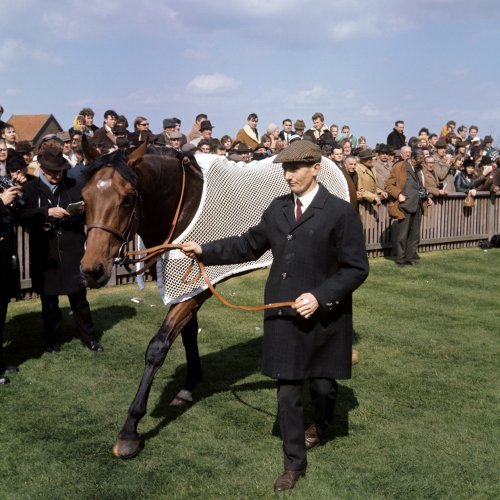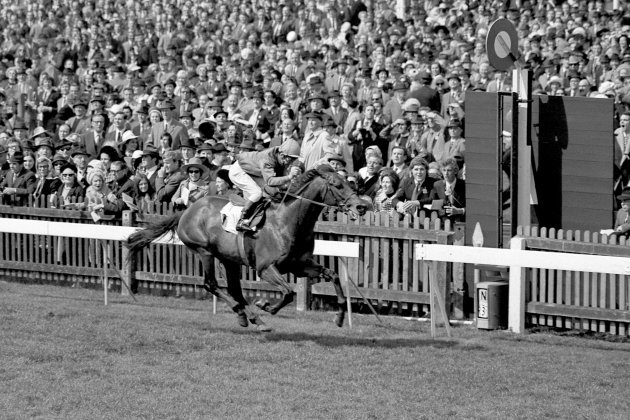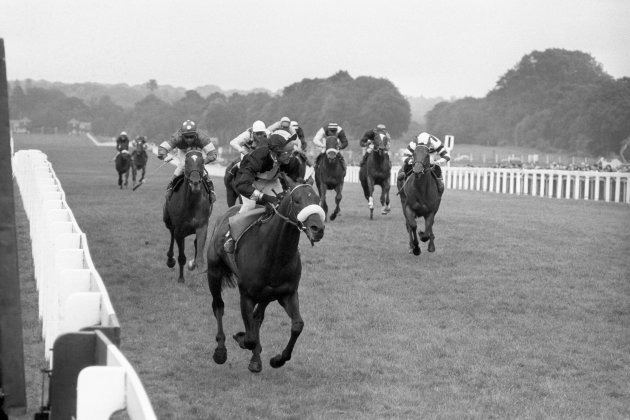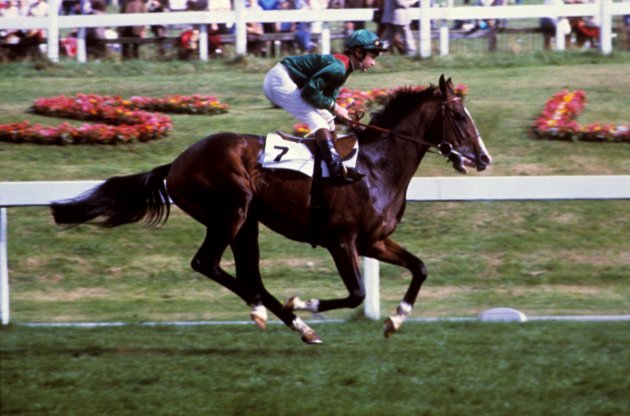THE SHAKESPEAREAN CLICHE that parting is such sweet sorrow rings true more than ever this weekend as superstar colt Frankel races for the final time in the Champion Stakes at Ascot.
Seeking to bow out with a perfect record of 14 wins from 14, Henry Cecil’s four-year-old has already guaranteed his place among an elite group of horses who can justifiably claim to be the best ever seen in the flat game.
And so as the sporting world prepares to say goodbye, we look at some of the other contenders in a debate that will never be settled to anyone’s satisfaction, even if Frankel does as many expect him to and canters home tomorrow afternoon.
1. Ribot
One of the sport’s first great stars, Ribot was the crowning achievement in the career of Italy’s top thoroughbred breeder Federico Tesio. ”I don’t want just a good race horse,” Tesio explained. “What I want is a superhorse.”
Winner of all 16 of his starts, Ribot took the world by storm and cemented his place in horse racing history with wins at the Prix de l’Arc de Triomphe in 1955 and the King George VI in 1956. He returned to Longchamp that autumn and left a top-class field drawn from across Europe and the United States standing, winning his second Arc by an official margin of six lengths.
Tesio never lived to see Ribot’s glory though. He died in May 1954, aged 85, never knowing the full potential of his super two-year-old.
2. Sea Bird
Though he doesn’t have the unbeaten record sometimes used as a crude marker for horses in the upper echelons of greatness, Sea Bird’s three-year-old season marks him out as one of the finest ever to take to the track. Trained in France by Etienne Pollet, he won seven of his eight races, the sole defeat coming at Longchamp in 1964.
He only raced once in Britain, a stunning performance at the 1965 Epsom Derby where he won by two lengths from Meadow Court, the horse who went on to win both the Irish Derby and the King George VI for Kildare trainer Paddy Prendergast that season.
In his final act before retiring to stud Sea Bird went head-to-head with one of the other French greats of the time, Reliance, and won, beating the field in the Prix de l’Arc de Triomphe by a staggering six lengths.
3. Nijinsky
Perfect records are fragile things, as the career of Vincent O’Brien’s legendary Nijinsky reminds us. Untouchable in his first 11 races, Nijinksy excelled as a three-year-old by winning the 2,000 Guineas and a highly-competitive Epsom Derby which included the French fancy Gyr, before completing a historic Triple Crown for the first time in 35 years with the 1970 St Ledger.
“We were always cantering,” jockey Lester Piggott said after his famous Derby win, following it up with one of the biggest understatements in sports history. “A grand ride, a grand horse.”
Illness and tiredness caught up with Nijinsky though, and as he attempted to take another stride towards greatness in the Prix de l’Arc de Triomphe, he was beaten for the first time by Sassafras. Defeat in his final race at Newmarket saw him finish with a career record of 11 wins and two defeats, but for many he still remains the finest horse ever seen.
4. Brigadier Gerard
Britain’s 20th-century superstar, Brigadier Gerard is the horse most frequently mentioned in the same breath as Frankel. With 18 wins from his 19 starts, Major Dick Hern’s charge became the benchmark by which all future British racing greats were destined to be measured.
Asked to compare two stars born years apart, his faithful jockey Joe Mercer said that the mark of The Brigadier’s achievements was in the quality of the horses who chased him home, not least Mill Reef and My Swallow in the 1971 Derby and France’s Faraway Son in the Sussex Stakes later that season.
The spectre of Brigadier Gerard’s sole defeat still hung over York in August as Frankel looked to make it 13 from 13 in the very race that had cost his predecessor perfection. By winning the Juddmonte International by 10-and-a-half lengths, Frankel settled the debate for many — but probably not for Mercer.
‘Everybody asks how Brigadier Gerard and Frankel compare,” he said. “Last year, for a bit of fun, I said he would have made a good lead horse for The Brigadier, who achieved so much in his lifetime it was amazing.”
5. Mill Reef
Alongside Nijinsky and Brigadier Gerard, the great Mill Reef was the third part of a majestic trinity which earmarked the beginning of the 1970s as a golden age of horse racing which is unlikely to ever be repeated.
Although it was Brigadier Gerard who came out on top in the 1971 Guineas, the only head-to-head meeting between the two, the defeat was a mere blip in a year which sees Mill Reef still lauded as one of the best middle-distance horses of all time.
The Derby, the Eclipse, the King George VI all followed before he finished his three-year-old season with a three-length win at the Arc, becoming the first English-trained horse in 23 years to win the Longchamp prize.
Wins in the Prix Ganay and the Coronation Cup the following season made it six straight Grade Ones without loss, but after a rematch against Brigadier Gerard was cancelled due to injury, a nasty leg break while training to defend his Arc title ended a stellar career prematurely.
6. Shergar
The circumstances of Shergar’s disappearance still remain shrouded in mystery but there are few doubts about his brilliance as a three-year-old or his place among the sport’s greats.
Bred by the Aga Khan in Kildare and trained by Michael Stoute in England, Shergar’s win at the 1981 Epsom Derby is still seen by many as the definitive performance in the race. Indeed by an objective measure — the winning margin — Shergar’s 10-length victory remains the longest in the Derby’s illustrious history. That day, 19-year-old Walter Swinburn — himself riding in his first Derby — said that he was “just a passenger on a very good horse.”
A derby double soon followed at the Curragh before Shergar closed out his racing career with a win in the King George VI and defeat in the St Ledger. Then things got interesting…
7. Sea the Stars
For many younger fans, the John Oxx-trained Sea The Stars is the definitive word in any debate about racing’s best-ever horse.
For some older admirers too, the evidence trumps many long, fond memories; after his outstanding run in the 2009 Prix de l’Arc de Triomphe — the last of six straight Group 1 wins in his three-year-old season — the trainer of the great Mill Reef, Ian Balding, conceded that Sea the Stars was the best of all.
In a spectacular six months Oxx’s star completed an unprecedented treble at Newmarket, Epsom and Longchamp, and so became the only horse ever to win the Guineas, the Derby and the Prix de l’Arc de Triomphe in the same season.
Top talents like Fame and Glory, Mastercraftsman, Conduit, and Youmzain all fell as Sea The Stars created his own unique place in horse-racing history.
